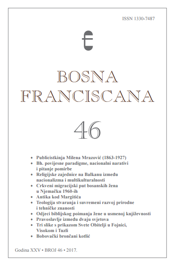Stranci u gornjovrbaškom kraju prema matičnim knjigama skopjanskih župa
Foreigners in the Vrbas Headwaters Area in the Western Part of Central Bosnia According to the Registries of the Skopje Parishes
Author(s): Ante ŠkegroSubject(s): Demography and human biology, 18th Century, 19th Century, Migration Studies
Published by: Franjevačka teologija Sarajevo
Keywords: the Vrbas headwaters area in the western part of central Bosnia; the Ottoman Vilayet of Bosnia; Venetian Dalmatia; Vicenza Italy; Brescia Italy; Bergamo Italy; Giuseppe Bonatti; Antonio Bonatti;
Summary/Abstract: Foreigners began to settle more intensively in the Vrbas headwaters area in the western part of central Bosnia from the last decades of the 18th century. In addition to the fertile soil, the abundance of water, and inexhaustible forest resources, this settlement was also stimulated by scarcities in Dalmatia, and particularly mobilisation to the intensive construction of communication routes and recruitment into the army after 1797. Immigration from the area under the control of the Austro-Hungarian Empire was also motivated by the breaching of laws and arbitrary abandonment of military duties along the border with the Ottoman Vilayet of Bosnia. These settlers in a new land, with only very rare exceptions, became serfs on the estates of the Islamic feudal magnats. Although it was rare, for various reasons some became apostate from the Catholic church and converted to the Muslim faith. Favorable living conditions were a constant reason for immigration into the Vilayet of Bosnia, particularly from more passively developed sections of Dalmatia. The Ottoman feudal magnats favored such immigration, often themselves encouraging it, as their estates could not survive without a viable peasant workforce. Such settlement was dominated by Catholics, who often in this manner returned to the long ago conquered or abandoned estates of their ancestors. Hence it is not surprising that among them appear people recorded with the last name Bošnjak (Bosnian) in the registries of the Catholic parishes of central Bosnia as well as those in the Vrbas headwaters area. The immigrants included those whose parents, or they themselves, had come from Italy and Hungary, and even Poland, as well as other countries under Venetian or Austrian rule. Often the motives for their migration were military and other offenses that prevented their return to their countries of origin. Although they were mostly Catholic, who in the areas under Ottoman rule entered into marriage with other Catholics and baptized their children, nonetheless the local church authorities had serious problems with some of them. Individuals could not even prove their free status so as to enter into a valid church-approved marriage, as was attested by their relatives and acquaintances. Some spread immorality in their new homeland, spreading venereal diseases among the local population, such as syphilis or “freniak” or the “French disease” (morbus Gallicus), as was noted in the registry books of the Skopje region catholic parishes.
Journal: Bosna Franciscana
- Issue Year: 2017
- Issue No: 46
- Page Range: 345-370
- Page Count: 26
- Language: Croatian
- Content File-PDF

